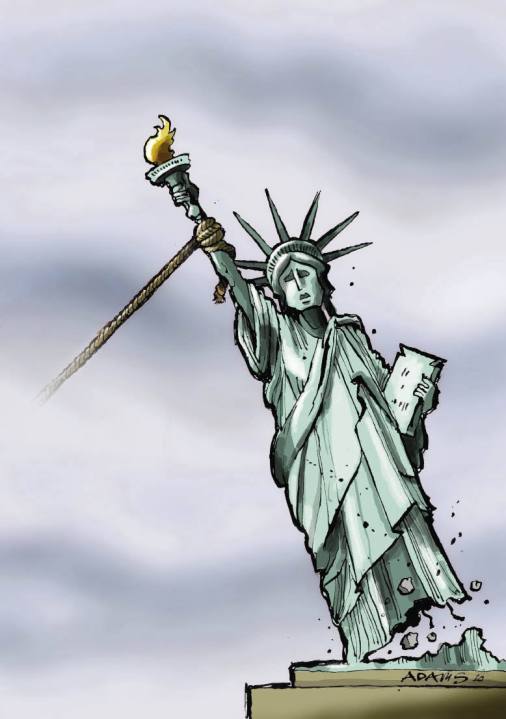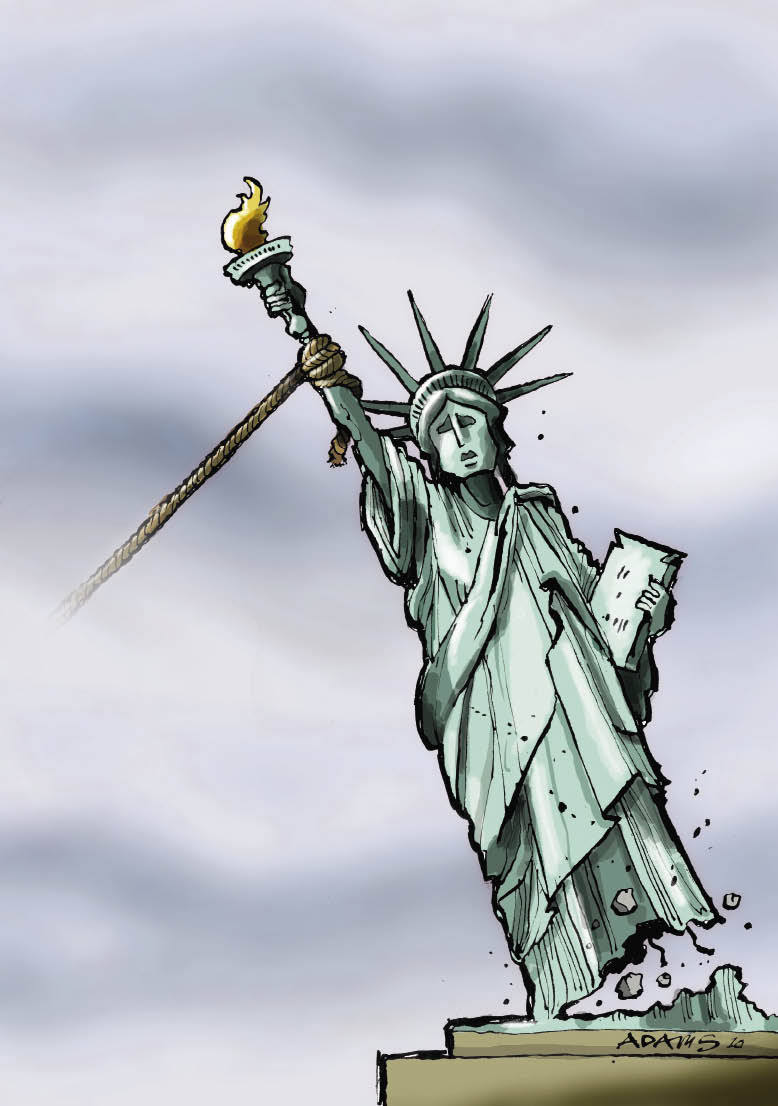Twenty years ago, Francis Fukuyama forecast the final triumph of liberal democracy and the ‘end of history’. As pro-democracy movements falter from Ukraine to China, he revisits his thesis — and asks if history has a few more surprises to spring
It looked like a revolution in reverse. The announced victory of Viktor Yanukovich in Sunday’s Ukrainian presidential election undid that country’s Orange Revolution of 2004 by returning to power the very man whom tens of thousands of pro-democracy protesters came out to defeat. And this is only the latest in a series of apparent setbacks for democracy in recent years. Over the last decade we have seen the collapse or discrediting of not just the ‘Orange’ movement, but many of the other so-called ‘rainbow revolutions’ across eastern Europe: the ‘Rose’ revolution in Georgia, the ‘Cedar’ revolution in Lebanon. Then there’s Vladimir Putin’s transformation of Russia into an ‘electoral authoritarian’ state, the undermining of democratic institutions by Hugo Chavez in Venezuela, and the rise of China as a successful authoritarian moderniser.
So what to make of it all? What Samuel Huntington described as a ‘third wave’ of democratisation began with Spain and Portugal in the 1970s and culminated in the fall of the Berlin Wall. Do the events of recent years mean this is now over? I argued in my book the End of History and the Last Man (1992) that liberal democratic principles are universal — have they been revealed not to be?
I think they are universal. But it is important to draw some careful lessons from the recent past. The first concerns the importance of institutions. The collapse of the Orange Revolution should teach us that enduring democracy is not just a matter of ideas and political passions, but of concrete institutions embodying democratic values. It is also about the human agents who create them: the right leaders can make or break a transition to democracy.
Viktor Yushchenko, the heroic leader of the Orange Revolution, turned out to be an incompetent president. He failed to build a broad democratic coalition, never got a handle on Ukraine’s corrupt and feckless state bureaucracy, and seemed more interested in pursuing a vendetta against Prime Minister Yulia Tymoshenko (loser of Sunday’s contest) than in delivering services to the Ukrainian people.
Since the fall of the Berlin Wall more than 20 years ago, there has been a huge disparity in post-communist outcomes. In Poland, Hungary, the Baltic states, and the Czech Republic, there has been solid support for democratic, rule-of-law states that could qualify to join the European Union. In Russia, by contrast, there was huge disagreement after 1991 not just over whether the state should be democratic or authoritarian, but over the country’s borders, ethnic identity, and relations with neighbouring countries. So the single most important determinant of which countries would go on to become successful, stable liberal democracies was the degree of consensus in favour of strong new state institutions.
In Russia, the generation which came of age in the Yeltsin years largely regarded the 1990s as a decade of weakness and humiliation. Such resentment instigated much of the support for Vladimir Putin. As for Ukraine, it has never been an independent state in its modern history, and ethnically it is cleft down the middle. So it is hardly surprising that the democratic consensus which the Orange Revolution activists hoped for five years ago has proved so elusive.
But the second major lesson of recent years is about international influences — and, in particular, the special role of the United States in world politics. When the Berlin Wall came down, it was a self-confident and economically successful superpower which served as a beacon to democrats from Gdansk to Beijing to Manila.
But Americans let the collapse of communism go to their heads. For many, it represented not just the broad quest for recognition of human dignity, but an affirmation of the particular American model. They saw the events of 1989 as a triumph, not just for the cause of liberty but of loosely regulated markets at home and muscular self-assertion abroad, unconstrained by international institutions. The soft power of the American example was translated into the ‘Washington Consensus’ in economic policy during the Clinton years, and then into the hard power of American invasion during the administration of George W. Bush.
The latter collapsed in the sectarian violence of Iraq, and the former blew up during the great financial crisis whose tail end we are still experiencing. As the hegemonic power for much of the 1990s and 2000s, the United States was bound to incur a lot of resentment from countries and people who felt they had no way of holding the US accountable for what it did to them economically. But this was made worse by the perception that US policymakers were overbearing. So the United State itself became an obstacle to the spread of its own ideals.
(For the record, while many people have associated my End of History thesis with American triumphalism, my book actually suggested that the true embodiment of the post-historical world would be the European Union rather than America, since it was Europe that was trying to replace traditional power politics with international law and institutions. This was certainly the view of the great French philosopher Alexandre Kojève, from whom my ideas were largely derived.)
The third lesson to be drawn from recent events is the connection between a degree of social equality and stable democracy. Market-oriented democracies naturally produce economic and social inequalities. Experience has shown that if market societies offer sufficient social mobility and shared growth, inequality per se is not a fatal defect. But in countries with high and entrenched levels of inequality, the legitimacy of formal democracy comes to be questioned by those excluded.
This is precisely what has happened in Andean countries like Venezuela, Bolivia and Ecuador in recent years, as populist leaders have ridden on the backs of newly mobilised social forces to upend existing democratic political systems.
So where does that leave us now? I think that even in the wake of the Ukrainian election and other recent reverses, the future of democracy is not so bleak. In the first place, democracy remains, in Amartya Sen’s words, the ‘default’ political condition: ‘While democracy is not yet universally practised, nor indeed universally accepted, in the general climate of world opinion democratic governance has achieved the status of being taken to be generally right.’ Very few people around the world openly profess to admire Putin’s petro-nationalism, or Chavez’s ‘21st-century socialism,’ or Ahmedinejad’s Islamic Republic.
No important international institution endorses anything but democracy as the basis for just governance. China’s rapid growth incites envy and greed, but its exact model of authoritarian capitalism is not one that is easily described, much less emulated, by other developing countries. Such is the prestige of modern liberal democracy that today’s would-be authoritarians all have to stage elections and manipulate the media from behind the scenes to legitimate themselves.
Not only has totalitarianism virtually disappeared; authoritarianism isn’t its old full-blooded self. Even a closer look at Ukraine’s election indicates that democracy is far from dead there. Viktor Yanukovich is hardly the former communist apparatchik he once seemed; he has distanced himself from Russia, endorsed Ukraine’s membership of the European Union, and hired an American political consultant to make himself more appealing to voters.
While the failure of the Orange coalition has bred cynicism among its former supporters, democracy is about accountability and not specific individuals being in power. If the Orange coalition screwed up, it doesn’t deserve to rule. While there is still a high degree of corruption and non-transparency in Ukrainian political life, it is still arguably more open and competitive than Russia’s.
The next phase of global history will be a challenging one, as America and Europe stumble to get back their economic balance. It seems doubtful that either the US or Britain will achieve the degree of growth in the next generation that they did in the previous one. But one of the great advantages of democracy is that it does not depend for its legitimacy on continuing high levels of economic growth, as the Chinese system does.
As we move forward, it is important to keep in mind the simple power of the idea of a government by, for, and of the people. We need to match those high ideals with unglamorous but steady investments in institution-building if liberal democracy is to deliver on its promises.







Comments